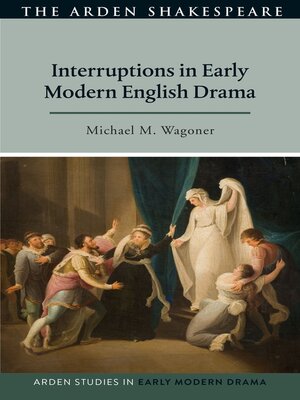Interruptions in Early Modern English Drama
ebook ∣ Arden Studies in Early Modern Drama
By Michael M. Wagoner

Sign up to save your library
With an OverDrive account, you can save your favorite libraries for at-a-glance information about availability. Find out more about OverDrive accounts.
Find this title in Libby, the library reading app by OverDrive.



Search for a digital library with this title
Title found at these libraries:
| Library Name | Distance |
|---|---|
| Loading... |
To interrupt, both on stage and off, is to wrest power. From the Ghost's appearance in Hamlet to Celia's frightful speech in Volpone, interruptions are an overlooked linguistic and dramatic form that delineates the balance of power within a scene. This book analyses interruptions as a specific form in dramatic literature, arguing that these everyday occurrences, when transformed into aesthetic phenomena, reveal illuminating connections: between characters, between actor and audience, and between text and reader.
Focusing on the works of William Shakespeare, Ben Jonson and John Fletcher, Michael M. Wagoner examines interruptions that occur through the use of punctuation and stage directions, as well as through larger forms, such as conventions and dramaturgy. He demonstrates how studying interruptions may indicate aspects of authorial style – emphasizing a playwright's use and control of a text – and how exploring relative power dynamics pushes readers and audiences to reconsider key plays and characters, providing new considerations of the relationships between Othello and Iago, or Macbeth and the Ghost of Banquo.
Focusing on the works of William Shakespeare, Ben Jonson and John Fletcher, Michael M. Wagoner examines interruptions that occur through the use of punctuation and stage directions, as well as through larger forms, such as conventions and dramaturgy. He demonstrates how studying interruptions may indicate aspects of authorial style – emphasizing a playwright's use and control of a text – and how exploring relative power dynamics pushes readers and audiences to reconsider key plays and characters, providing new considerations of the relationships between Othello and Iago, or Macbeth and the Ghost of Banquo.







